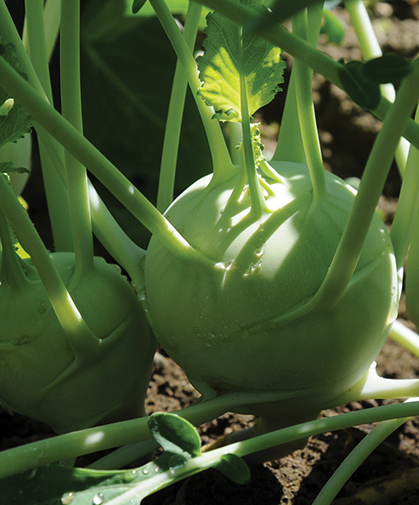Kohlrabi - Key Growing Information
SCIENTIFIC NAME:
Brassica oleracea var. gongylodes CULTURE:
Kohlrabi prefers mild or cool weather. It is grown throughout the season in the North, and during fall and winter in the South. Fertile, well-irrigated soil with a pH of 6.0-7.5 promotes rapid growth, which makes for a sweeter, better-tasting crop.DAYS TO MATURITY:
From direct seeding; for days to maturity from transplanting, subtract about 14 days.TRANSPLANTING:
For earliest crops, sow 3-4 seeds per inch in open flats (2 seeds/cell in cell flats, thinning to 1 plant/cell), 4-6 weeks before transplanting out. Transplant 4-5" apart; for 'Kossak,' transplant or thin to 10" apart.DIRECT SEEDING: Sow 15 seeds/ft., 1/4- 1/2" deep, in rows 12-18" apart. Thin fresh-market varieties to 4" between plants. Thin storage varieties to 10" between plants. AVG. DIRECT SEEDING RATE:
250 seeds/16', 1,000 seeds/66', 436M/acre at 15 seeds/ft. with rows 18" apart.DISEASES:
Adhere strictly to a preventive program including: (1) long crop rotations with non-brassica crops, (2) clean starting mixes and outdoor seedbeds, and (3) strict sanitation practices. Johnny's Selected Seeds only sells seed lots of kohlrabi that have tested negative for black rot (Xanthomonas campestris pv. campestris) and black leg (Phoma lingam). HARVEST: Harvest when roots are about 2-3" diameter; 8" diameter for storage varieties.SIZED SEEDS:
Standard except where noted.TRANSPLANTS (AVG.):
4,500 plants/oz., 800 plants/1,000 seeds. SEEDS/OZ. (AVG.): 6,200.PACKET:
100 seeds, sows 8'.

